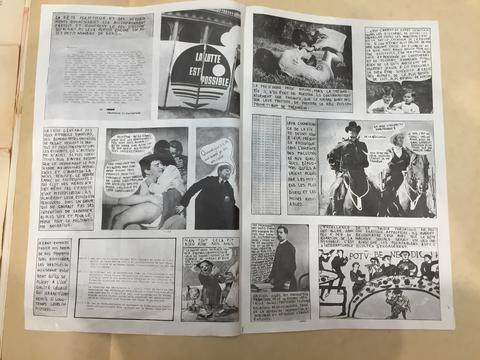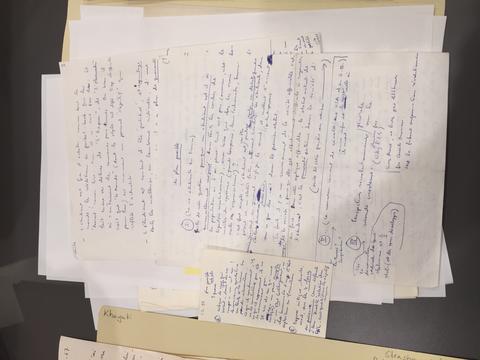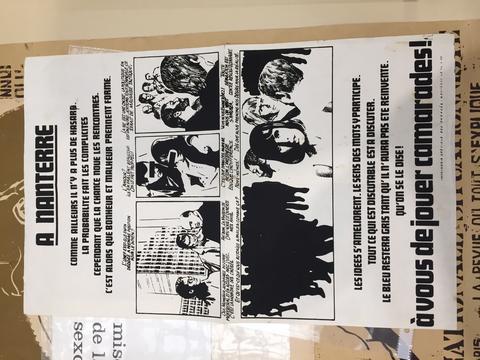From Strasbourg to Paris
This week is about the lead-up to May ‘68 in France and there are a lot of disparate factors to make sense of; though the six objects we chose are directly related to Situationism, they too reference the world of changes France was going through.
We’ll go more in depth shortly but our six items are: Vaneigem’s manuscript of La Longue Revolution with notes by Debord, Debord’s manuscript of “De la misère en milieu etudiant”, Le retour de la colonne Durutti by Andre Bertrand along with other posters from Strasbourg, Bertrand’s collected documents accounting for AFGES funds, a poster by Bertrand advocating solidarity with Nanterre, and issues of magazines put out by the Enrages of Nanterre.
Situating ourselves in a timeline of the lead-up to 68, dates pulled from readings and from other knowledge, here’s what that looks like. After WWII, France is immediately pulled into war in Vietnam, and then immediately after that, war in Algeria. Fanon and Feldman both discuss these events, which serve to motivate SI; Khayati, from Tunisia, first teams up with Debord in 65 to write Address to Revolutionaries of Algeria and all other Countries.
As the 60s progress, the Strasbourg events get the SI the most notoriety among the general public that it has gotten up to that point. 67 heats up with various strikes in mines and factories, and finally the students at Nanterre start radicalizing through the Enragés and the occupation of administrative buildings after Daniel Cohn-Bendit is disciplined in January 68.
However, here, it might be good to bring in the Kristin Ross reading, May ‘68 and its Afterlives. She argues that May 68 was largely a working class revolution, the significance of which was later coopted by cultural figures who argued that the moment was about expression and play. What does the evidence of our sources say? Might our timeline actually be better represented as two separate timelines?
Here we see, taking Ross’s hypothesis further, that there are actually two sequences of events leading to two May ‘68s. There is the student stream, catalyzed by Debord, detournement, SI, etc but SI doesn’t have enough reach before May 68 to fully account for millions of people on strike.
Debord also writes letters to the Andrés during 1966 as they take over the student union. Much of this was probably coordinated in person at the 7th SI Congress in Paris in July 1966, and indeed we find notes on the proceedings in the papers of Vaneigem, Khayati, and Bertrand/Schneider. Bertrand drops La retour de la colonne Durutti in October 1966, papering the Strasbourg campus with copies of the détournée comic strip. The Durutti has a long afterlife in the UK. In November, Khayati prints 10000 copies of de la misere and Debord chides him worrying about making sure Khayati sends it to important people.
Again we get a sense of SI’s smallness in that the initial 1966 list is handwritten by several different folks and is about 60 names long. The 1967 list is much longer and much more international and the 1968 list is longer still. Another hint of how small SI is before Strasbourg is that news coverage of the events (Bertrand’s folder “La Justice”) puts “Situationist” in quotes throughout. Strasbourg helps provide SI a bigger platform to reach a larger French audience.
The events at Nanterre in 1968 may or may not have much to do with Strasbourg. Ross hints that, aside from the police intervention in the campus, it was actually the screening of a film on the 1967 Lyon strike in Feb 68 that kicked off the formation of the Enrages. This poster by the Enragees somehow got to Bertrand.
As we know, the closing of Nanterre led to flareups at the Sorbonne on May 3 which we typically see as the start of May 68. However, this was all a movement by intellectuals and students and the avant garde. The mass movement doesn’t start until the general strike begins on May 13. Conventionally this is seen as being in sympathy with the students against police brutality but there are other accountings for this date: it is the 10th anniversary of the end of the Fourth Republic in a coup d’etat which installed Charles de Gaulle as president. Similarly, the 22nd of March is not just in response to the arrest of students but also the day that Czech president Novotny resigned allowing the reforms of Dubcek to begin.
Obviously there are links between the student movement and the mass movement, but how extensive are they? And how extensive is the role of SI? Of Debord? Would it have happened anyway in reaction to the growing tensions in French society following the end of Empire?
This broadsheet comic illustrated by André Bertrand is perhaps the most famous of the published documents from the SI’s occupation of the university in Strasbourg. Printed in October 1966, the comic was pasted up all over the Strasbourg campus and into the city, and almost certainly travelled further.
There is a lot of correspondence between Guy Debord and Mustapha Khayati starting in 1965, with their collaboration on “Address to the Revolutionaries of Algeria and of all Other Countries,” and continuing through to the 1970s. In 1966, they begin collaborating on what will become “De la misère en milieu étudiant” (On the Poverty of Student Life), printed in 10,000 copies by the co-opted Association Fédérative Générale des Étudiants de Strasbourg (AFGES).
This poster, most likely designed by Andre Bertand, is one of the first documents from the agitations at Nanterre by the Enrages, a group of students who rebelled against strict moral codes, police on campus, and harsh treatment of Daniel Cohn-Bendit, a student who had insulted the Minister of Youth and Sports at the opening of a new swimming pool in January of 1968.


